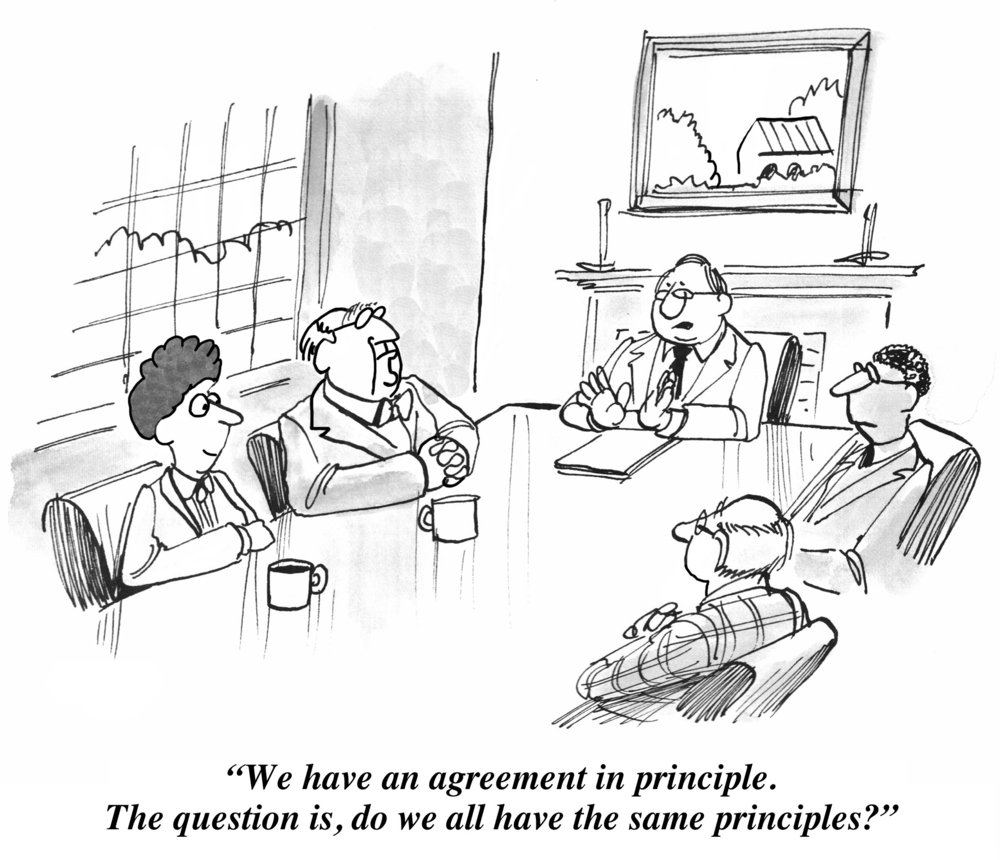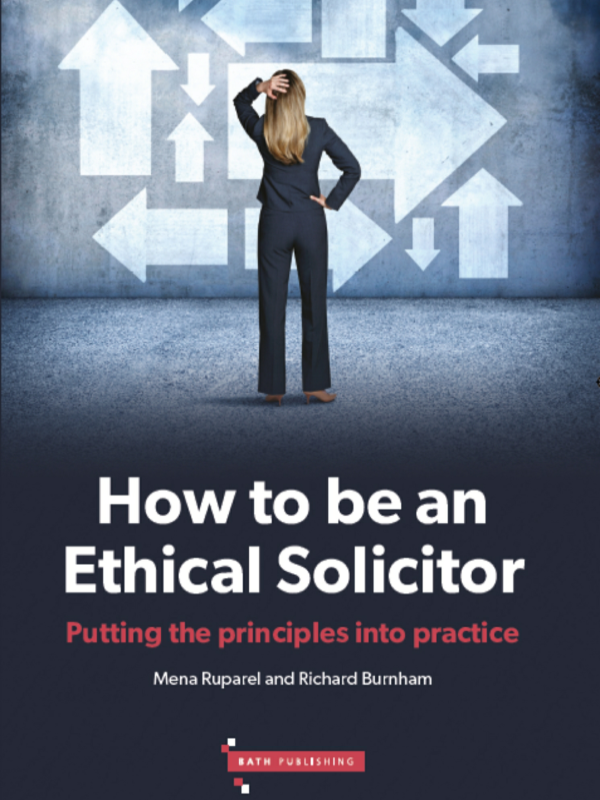Book review: How to be an ethical solicitor by Mena Ruparel and Richard Burnham
David Rosen reviews a primer on legal ethics which aims to spark debate and help lawyers develop an instinct for doing the right thing rather than relying on a prescriptive all-embracing code of conduct. … Continue reading about Book review: How to be an ethical solicitor by Mena Ruparel and Richard Burnham

I was reminded of Groucho Marx’s words before embarking upon reading and reviewing this book:
“Those are my principles, and if you don’t like them…well, I have others.”
As a trainee solicitor over two decades ago, I was given a few pointers on ethics and behaviour in the profession:
1. You can be robust in correspondence but always be polite when meeting your opponent, and their clients. One day those clients might become your clients, or you might be working for your opponent, or vice versa. Always leave yourself an entry and an exit to negotiate and to cooperate where necessary.
2. Whatever you do or say whether privately or publicly, may one day be placed before a Judge so always be mindful of this;
3. The law firm in which you practice is your most important client. Do not disrespect it, know that you represent it, and always make them proud;
4. Never. Ever. Ever lie, misdirect, or otherwise mislead the Court because you will one day be an officer of the courts, and moreover once you cross that line you will be branded as underhanded, conniving, and untrustworthy by your peers, your opponent, and the Courts.
Sparking debate
Mena Ruparel begins in her introduction to set out the aim of this book: “to spark debate”, and most certainly it achieves a good starting point to challenge the place of ethics within the Solicitors’ Regulation Authority (SRA) Code of Conduct.
When I started upon my journey studying law as an undergraduate, my mind was awash with legal and ethical dilemmas: How do you defend someone you believe is guilty? Can you act for someone who wishes to plead not guilty having told you that he had committed a heinous crime?
I looked up to those lawyers whom I knew were in the highest echelons of society and held in the highest esteem. The profession at least in my own perception, was full of ‘gentlemen’ who were men of honour and integrity; trusted and discrete in their advice and discussing nothing about their clients or cases privately, publicly, or at all. (Unlike now, women were in a minority in law over 20 years ago)
Moral compasses were aligned with how a solicitor ought to behave privately and publicly because society was politer and more reserved. Law firms prided themselves as institutions providing a public service. Solicitors generally knew the right thing to do in any particular scenario, they did the right thing for the right reasons of honesty and integrity.
The profession was far less regulated and scandals were less sensationalised as they are now.
The daily pressures faced by law firms are that they provide a service but they also run a business with a view to making a profit, and as to what extent law firms have adopted a criminogenic corporate culture (a theory to suggest that all businesses have the propensity to commit crime, in order to increase profit margins), remains unknown. Certainly, the focus on law firms as businesses has perhaps clouded the judgments of solicitors at the top, and ethics within the culture of provision of legal services has become unclear.
There was a time in our not too distant past, when the art of writing a letter took days to perfect. There were rules and protocols to follow, and most certainly a polite way to write, mindful of Debrett’s book on etiquette and modern manners. Protocols and conventions of polite society dictated what was, and was not acceptable; whom was educated and whom lacked a fundamental understanding by which to construct a sentence and to master rules of grammar.
The need to communicate efficiently meant that the desire to embrace technology and social media was adopted without too much thought applied as to its proper use, the timing of replies, the apparent 24 hour access to your lawyer by all and any means, and a client’s frustration at not receiving replies immediately whether the lawyer was expected to work inside or outside of usual business hours. We have become slaves to technology and this book gives a welcome insight as to ethics, rules, and regulated use of technological communications most notably the contents of those communications.
The SRA regulations over the years have seen a move from rules-based regulations to outcomes-focused regulation (‘OFR’), and as the authors observe: “Both the SRA and the Law Society have publicly increased their focus on ethics as part of the OFR regime and to maintain the brand of the solicitor”.
Whether you the reader consider that ethics ‘ought’ to play a better part in decision-making, or that they ‘must’ play a part, is to be dictated for solicitors as a move into the next decision-making era, and what is expected of solicitors in the future by the Law Society and the SRA.
The motto of this book cannot be stated and re-stated and re-emphasized enough:
“Know the right thing; do the right thing; for the right reason.”
This translates in terms of a practical approach, say the authors, as follows:
“Look at the Principles, look at the Outcomes, and look at the Indicative Behaviours of OFR, and then: Apply ethical reasoning to achieve the ‘right thing.”
Ethics as foundation
All of our moral compasses need re-calibrating it seems, with ethics as a foundation to build upon the Wild West of social media. Do we engage? Do we share in a seemingly distasteful joke? Are we forbidden from doing so? How would clients who are ‘friends’ on social media regard what we choose to like, share or comment upon? How would the SRA or the SDT regard such interaction?
Presentation of this book is a pleasure to read. Bullet points and diagrams and colour and use of shading make easy reading always remaining true to the title and the proclaimed motto. Information is presented almost in a social media manner, providing the reader with soundbytes of information, always keeping the reader interested.
Somewhere solicitors lost public confidence, perhaps with the introduction of public shaming wrongdoers, blending and dissolving authorised activities previously reserved to solicitors and now expanded to non-solicitors (i.e. licensed conveyancers, para-legals etc…). Solicitors fell from their moral and ethical proverbial pedestals of a bygone era as trusted and discrete advisors. Have solicitors lost their brand? Are they still distinctive from non-solicitors?
If we are providing a public service why does the Profession not adopt the Nolan principles otherwise known as ‘The Seven Principles of Public Life’, published by the Committee on Standards in Public Life 31st May 1995 namely: selflessness, integrity, objectivity, accountability, openness, honesty, and leadership?
I hope that the authors will continue with their good work by giving further examples in future publications of how one ought to behave in given circumstances and scenarios outside of those reported by the SDT and SRA published cases. There should have been more examples given as far as this reader is concerned.
Desiderius Erasmus once wrote a collection of quotations, sayings, and illustrations, to a Prince entitled ‘Apophthegmata’ (Things well said, to the un-initiated). The aim of that book was that just as a wrestler learns to wrestle physically this way and that way according to balance, strength, and strategy, so must a prince know how to behave, how to act, how to react, what to say, and what not to say. This book on How to be an Ethical Solicitor does not come close to Apophthegmata, but neither was it intended to be an all-encompassing reference book, but rather the thought-process involved as to how best to use and apply ethics within the current and future SRA Codes of Conduct.
This is an important book to spark interest and enthusiasm within the profession. Certainly it could play an important role as a spark/an ember to ignite in solicitors and in the Profession to build upon an awareness within the SRA and the Law Society to develop solicitors ethically and to be more in touch with their environment and surroundings internally and externally. How much more so ought this to apply to solicitors regulated both in private and public life to learn and adopt sound ethics and judgment and to build upon previous experiences.

How to be an Ethical Solicitor, by Mena Ruparel and Richard Burnham (Bath Publishing, £29.50)
Featured image cartoon via Shutterstock.